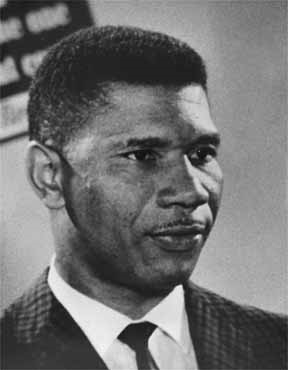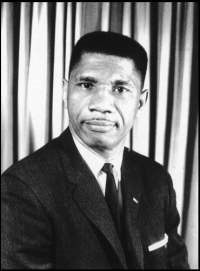 |
| A photo of Medgar Evers (http://www.olemiss.edu/depts/english/ms-writers/dir/evers_medgar/) |
Perhaps one of the most shocking things about Medgar Evers is the number of years it took for his murderer to be caught and sentenced. This short report will hopefully summarize a few major acts that Medgar Evers made against segregation.
 |
| Another photo of Medgar Evers (http://www.olemiss.edu/depts/english/ms-writers/dir/evers_medgar/) |
Medgar Wiley Evers was born on July 2, 1925 in Decatur, Mississippi. He was the third of four children; his father was the owner of a small farm and worked at a nearby sawmill.
He was very determined to get his education, and endured many hardships throughout his school life. These include walking twelve miles both ways to earn his high school diploma, and “…when we were walking to school in the first grade, white kids in their school buses would throw things at us and yell filthy things….”
Along with all of these school-related torments, Evers’ being an African-American brought him tragedies. According to a quote from Medgar, when he was “…eleven or twelve, a close friend of the family got lynched. I remember the Saturday night a bunch of white men beat him to death because he sassed back to a white woman. They just left him for dead on the ground. Everyone in town knew about it, but never said a word in public. I went down and saw his bloody clothes. They left those clothes on a fence for about a year….”
He finished his earlier school years rather quickly, but he was always bothered by how no one ever stood up for anything; how there were no honors in the church for the dead man and no protests. Quoted, “I used to watch the Saturday night sport of white men trying to run down a Negro with their car, or white gangs coming through town to beat up a Negro.”
Evers joined the army during WWII, and later was discharged in 1946 after honorably serving. After he was discharged, Medgar attended Alcorn College, which is now known as Alcorn State University, and was a member of many school activities, such as the debate team and the football and track teams. At Alcorn, he met Myrlie Beasley, and they married on December 24, 1951.
Evers and his wife then moved to Mound Bayou, Mississippi, and began to establish local chapters of the NAACP throughout the Delta. They organized boycotts of gas stations that refused to allow blacks to use their restrooms, as well as many other things. Later, Evers was appointed Mississippi’s first field secretary for the NAACP.
Myrlie and Medgar then moved to Jackson, Mississippi, working to set up more NAACP offices. He investigated violent crimes against African-Americans, and looked for ways to stop them.
Quoted from an article in the Encyclopedia of World Biography: Second Edition, “In the 1960’s, his boycotting of Jackson merchants attracted national attention, and his efforts to have James Meredith admitted to the University of Mississippi in 1962 brought the much needed federal help for which he had been soliciting. Meredith was admitted to Ole Miss, a major step in securing civil rights in the state;” however, a riot on campus left two people dead and Evers’ involvement in this and other activities increased the hatred many people felt towards Evers.
Sadly, on June 12, 1963, Medgar Evers was murdered. His suspected killer was Byron De La Beckwith, a white supremacist. There was seemingly obvious evidence; a gun was found about 150 feet from the site of the shooting had Beckwith’s fingerprint on it, and several witnesses had placed Beckwith in Evers’ neighborhood the night that he was shot.
Unfortunately, Beckwith also produced witnesses and claimed that the gun was stolen from him several days before the shooting occurred. One of his witnesses was a policeman, who swore that Beckwith was at least sixty miles away from Evers’ home when he was shot. Beckwith stood trial two times in the 1960’s, but both times the all-white juries couldn’t reach a verdict.
Leading back to the introductory paragraph, it took a shocking thirty-one years until Beckwith was fairly trialed. In 1994, not so long ago, Byron De La Beckwith, Evers’ murderer, was convicted and life sentenced to prison.
Medgar Evers is a hero in my eyes because he worked hard to end segregation and organized activities such as integrated schools, restaurants, and voter registrations drives. He still strived to bring civil rights in motion even when numerous threats and violent acts were enforced upon him and his family; he was in danger and yet he proceeded to bring fairness and peace between whites and blacks. “To those who opposed such things, he was thought to be a very dangerous man.”
A quote from his wife, Myrlie Evers, “We both knew he was going to die.”
In addition, Evers’ death brought President John Kennedy to ask Congress for a comprehensive civil-rights bill, and President Lyndon Johnson signed it the next year, making civil rights an official law.
Medgar Evers will not be forgotten. Several books, movies, monuments, and articles have been created in his name, such as Medgar Evers swimming pool in Seattle, Washington, and movies like Ghosts of Mississippi. He and many other civil rights fighters gave up their lives merely supporting what they believed in.
Page created on 5/31/2005 12:00:00 AM
Last edited 4/22/2019 4:53:04 AM
